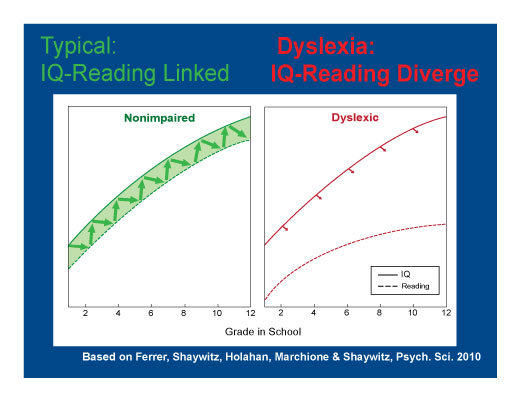YCDC Research
Dyslexia Study Uncouples Reading and IQ
E. Ferrer, B.A. Shaywitz, J.M. Holahan, K. Marchione, and S.E. Shaywitz
Psychological Science 2010

Brief Summary
The definition of dyslexia that has been established scientifically and used for over a century is an unexpected difficulty in reading—unexpected in relation to: intelligence, age/grade level, education and professional status. Lacking, however, have been empirical data demonstrating that dyslexia itself is unexpected.
As shown in the figure, scientific evidence now provides empirical support for the unexpected nature of dyslexia. The left panel shows the relationship between IQ and reading in typical readers. Here, IQ and reading both track together; they are dynamically linked. IQ influences reading, and reading Influences IQ. In contrast, the right panel shows the relationship between IQ and reading in dyslexic children. Here, IQ and reading dissociate; IQ and reading are uncoupled. IQ and reading go their own separate ways. In practical terms, these data provide strong evidence that in dyslexia a person can have a very high IQ and yet read at a much lower level.
The results of this study provide empirical, scientific evidence to support the conceptual basis of dyslexia as an unexpected difficulty in reading in children who otherwise have the intelligence to learn to read.
To read the full journal article, download the PDF by clicking here.
